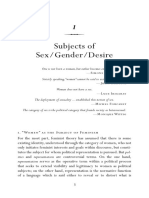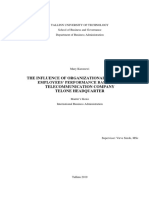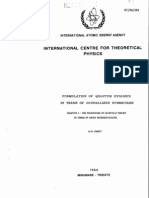Abstract On Butler'S 'Gender Trouble (Subjects of Sex/Gender/Desire) '
Abstract On Butler'S 'Gender Trouble (Subjects of Sex/Gender/Desire) '
Uploaded by
Antonella MarreirosCopyright:
Available Formats
Abstract On Butler'S 'Gender Trouble (Subjects of Sex/Gender/Desire) '
Abstract On Butler'S 'Gender Trouble (Subjects of Sex/Gender/Desire) '
Uploaded by
Antonella MarreirosOriginal Title
Copyright
Available Formats
Share this document
Did you find this document useful?
Is this content inappropriate?
Copyright:
Available Formats
Abstract On Butler'S 'Gender Trouble (Subjects of Sex/Gender/Desire) '
Abstract On Butler'S 'Gender Trouble (Subjects of Sex/Gender/Desire) '
Uploaded by
Antonella MarreirosCopyright:
Available Formats
ABSTRACT ON BUTLER'S 'GENDER TROUBLE (SUBJECTS OF
SEX/GENDER/DESIRE)'
ABSTRACT ON BUTLER'S 'GENDER TROUBLE (SUBJECTS OF SEX/GENDER/DESIRE)'
Butler understands that 'existing identites' of women as the subject of feminism is
only a representation, and this representation has a dual aspect
a) Representation of the women as a subject serves as the operative term within
a political process for visibility and legitimacy
b) Representation is the normative function of a language which is said either to
reveal or to distort what is assumed to be true about the category of women.
Foucault points out that juridical systems of power produce the subjects they
subsequently come to represent
Juridical power inevitably produces what it claims merely to represent
the law produces and then conceals the notion of a subject before the law in
order to invoke that discursive formation as a naturalized foundational premise
that subsequently legitimates that law's own regulatory hegemony
Apart from the foundationalist fictions that supports the notion of the subject,
however, there is the political problem that feminism encounters in the
assumption that the term women denotes a common identity
Denise Riley's 'Am I That Name?' criticizes that
it becomes impossible to separate out gender from the political and cultural
intersections in which it is invariably produced and maintained
Universalist feminism colonializes non-Westerns ('Third World' and 'Orient') as
essentialist barbarisms
Strategic uses of essentialism are criticezed for strategies always have meanings
that exceed the purposes for which they are intended
An uncritical appeal to such a system for the emancipation of 'women' will be
clearly self-defeating !!!
This doesn't imply refusing representational politics, which is impossible for her,
but simply to operate a feminist genealogy of the practices legitimizing gender
departing from what Marx calls the historical present
Feminist genealogy must contest reifications of gender and identity on bases of
the variable methodologies and normativities through which they are founded.
Perhaps, paradoxically, representation will be shown to make sense for feminism
only when the subject of women in nowhere presumed
Her genealogy criticizes the compulsory order of Sex/Gender/Desire
One way the internal stability and binary frame for sex is effectively secured is by
casting the duality of sex in a prediscursive domain
It would make no sense, then, to define gender as the cultural interpretation of
sex, if sex itself is a gendered category
In one such interpretation the cultural horizons of gender would thus remain
determined by the anatomically differentiated bodies
While she criticizes this essentialism of the Sex (body) settling the grounds of
gender, she doesn't agree with Simone de Beauvoir (variable and volitional
constructivism) that one can simply construct and deconstruct the body to
experience gender as it pleases one better
Beauvoir proposes that woman are the Other in a sense that they are marked out
of universality to which man belong
Women become women when they are marked/ restricted by the society due to
their bodies, while the male body flows disavowed and universal without being
ever marked
Butler points that the very 'choice' of how to experience the body is itself a socialy
contructed aspect
Butler asks: To what extent does the body come into being in and through the
mark(s) of gender? How do we reconceive the body no longer as a passive
medium or instrument awaiting the enlivening capacity of a distinct material will?
Butler follows Irigary criticizing that women are not only the Other in a Saussurian
(Sartrean, as she refers) relation of Self and Other but, instead, that women are
unrepresentable in the phallogocentric language and its closed phallogocentric
signifying economy
masculine constitute the closed circle of signifier and signified
The entire structure of representation is inadequate
Women as the sex which is not one, then, provides a point of departure for a
criticism of hegemonic Western representation and of the metaphysics of
substance that structures the very notion of the subject.
My personal comment is that here she follows Foucault on identifying a contest
mechanism of power against the hegemonic one and, through it, develops its
genealogy.
Butler points to a context of socially instituted gender asymetry
Butler finds Beauvoir feminism of a female body as the space of contestation and
freedom to follow thephilosophical tradition started with Plato and continued
through Descartes, Husserl, and Sartre – that ofdistinction between soul
(consciousness, mind) and body
This distinction invariably supports relations of political and psychic subordination
and hierarchy
Mind subordinates the body, and eventually entertains the fantasy of fleeing its
embodiment.
Asymetry comes as masculinity is associated with mind and body with feminism.
Butler contrasts Beauvoir and Irigary as the first points to an asymmetrical
dialectic and the second to the dialectic itself as the monologic elaboration of a
masculinist signifying economy
Butler, however, extends her critiques to Irigary for, despite broadening the scope
of feminist critique, her analysis has a globalizing reach of a universalist aspect (as
if she proposed another universality instead of the phallogocentric one)
Feminist critique ought to explore the totalizing claims of a masculinist signifying
economy, but also remain self-critical with respect to the totalizing gestures of
feminism. The effort to identify the enmy as singular in form is a reverse-
discourse that uncritically mimics the strategy of the oppressor instead of offering
a different set of terms
The colonizing gesture is not primarily or irreducibly masculinist
Butler also criticizes the way Irigary pledges primacy to the 'dialectical
appropriation and suppression of the Other' among the masculinist tacticts, for
she – Butler – believes that not even the oppression operates itself in a universal
linear and centralized way through which it sygnifies language;
Butler also claims that such oppressive tactique is also present on other
opressions beyond the masculinist one.
Paradoxically, Beuvoir prefigured this impossibility [her own phallogocentrism] in
The Second Sex when she argued that men could not settle the question of
women because they would then be acting as both judge and party to the case
Butler also criticizes efforts to formulate coalitional politics towards ideal models
of women without assuming in advance a content for 'women', because in the
process they end up imposing the ideal in advance
Creation of womens through dialogue misses the point that dialogue is itself
culturally specific and historic, so some speakers may feel secure that
conversation is happening while anothers may be sure it is not.
She points that the power relations that condition and limit dialogic possibilities
needs first to be interrogated
My personal comment here is to highlight a connection with Kaviraj's (not sure)
concept that imagination is the limit of a social reality.
Butler than proposes an antifundationalist approach to coalitional politics:
assuming that neither identity is a premise nor that the shape or meaning of a
coalitional assemblage can be known prior to its achievement
An open coalition, then, will affirm identities that are alternately instituted and
relinquished according to the purposes at hand; it will be an open assemblage
that permits of multiple convergences and divergences without obedience to a
normative telos of definitional closure.
As a result, Butler genealogy's aims at the issue of; to what extent do regulatory
practices of gender formation and division constitute identity?
Her genealogy shows that the heterosexualization of desire rquires and institutes
the production of discrete and asymmetrical oppositions between feminine and
masculine, where these are understood as expressive attributes of male and
female
The cultural matrix through which gender identity has become intelligible requires
that certain kinds of identities cannot exist – that is, those in which gender does
not follow from sex and those in which the practices of desire do not follow from
either sex or gender
Judith Butler's 1990 "Gender Trouble" was widely acclaimed as a
groundbreaking book due to its revolutionary ideas regarding gender
identity and the relations between gender and sex and the introduction of
the notion of gender as performance or gender performativity.
In "Gender Trouble" Judith Butler undermines the distinction between sex
as a natural given category and gender as an acquired cultural- social
category. Butler argues that sex also is a socially constructed category
which stems out of social and cultural practices and in the context of a
discourse that has a history and its own social and political dynamics.
In "Gender Trouble" Judith Butler develops her famous performative theory
of gender (and the analysis of drag queens in this respect) which tries to
account the manner in which a subject identity is formed while establishing
Butler's claim that gender identity is not a manifestation of intrinsic essence
but rather the product of actions and behaviors, that is, performance. In
other words, Judith Butler argues that everyday actions, speech utterances,
gestures and representations, dress codes and behaviors as well as certain
prohibitions and taboos all work to produce what is perceived as an
essential masculine of feminine identity. Butler aims at deconstructing this
notion of integrated, stable identity as the extension of an inner essence,
and the illusion of the sexual body, which are in Butler's view repressive
and dangerous, but also undermineable.
Judith Butler relies in "Gender Trouble" on Michel Foucault's theory
presented in "Discipline and Punish", which challenges the relations of
body and soul. Foucault argued that oppression imposed on prisoners is
not internalized but is rather imprinted or marked on their bodies. Methods
of discipline and punishment act on the body and form the image of
the recalcitrant inner soul. This image regulates and justifies the actions of
power upon the body. Foucault's argument, adopted by Judith Butler, is
that the soul is the prison of the body, and not the other way around as was
widely held in western culture. In this Foucault means to argue that
discourse formations that deal with the human soul and define it essentially
operate through the body and on the body, shaping it and marking it with
the traces of the alleged "soul" which hides somewhere deep inside. In
"Gender Trouble" Judith Butler genders Foucault's notions and holds that
gender is in fact the predominant cultural agent which operates on the
body, thus constituting the concepts of masculinity/femininity and the
identities of heterosexuality/homosexuality. Judith Butler's agenda in
"Gender Trouble" is to deconstruct the essential nature of gender identity
and to expose it as the fabrication that it is.
You might also like
- Queer Theory An Introduction. JAGOSEDocument3 pagesQueer Theory An Introduction. JAGOSEEduardo Espíndola0% (1)
- PINKUS. Subject Positions and Positioning - Importante - Discurso e Poder - Situações ReaisDocument3 pagesPINKUS. Subject Positions and Positioning - Importante - Discurso e Poder - Situações ReaissoundsmakerNo ratings yet
- Allegorical Interpretation of The BibleDocument4 pagesAllegorical Interpretation of The BibleZakka Labib100% (3)
- 3) Subversive Bodily Acts - Judith ButlerDocument2 pages3) Subversive Bodily Acts - Judith Butlerrayrod614100% (4)
- Performative Theory of Gender The Analysis of Drag Queens: RecalcitrantDocument1 pagePerformative Theory of Gender The Analysis of Drag Queens: RecalcitrantLaraNo ratings yet
- Baudrillard Sucks (Debate)Document5 pagesBaudrillard Sucks (Debate)Owen Schalk100% (1)
- "All That You Touch You Change": Utopian Desire and the Concept of Change in Octavia Butler's Parable of the Sower and Parable of the Talents by Patricia Melzer, Femspec Issue 3.2From Everand"All That You Touch You Change": Utopian Desire and the Concept of Change in Octavia Butler's Parable of the Sower and Parable of the Talents by Patricia Melzer, Femspec Issue 3.2No ratings yet
- Atomic AttractionDocument21 pagesAtomic Attractiongogo draws35% (23)
- Gender Trouble: Feminism and The Subversion of IdentityDocument6 pagesGender Trouble: Feminism and The Subversion of IdentityAmiraEsmat0% (1)
- Judith ButlerDocument2 pagesJudith Butlerpakhi sharmaNo ratings yet
- Gender Trouble: Feminism and The Subversion of Identity Is A Book by The PhilosopherDocument4 pagesGender Trouble: Feminism and The Subversion of Identity Is A Book by The PhilosopherOka FranandoNo ratings yet
- Herculine Barbin and The Omission of Bio PDFDocument16 pagesHerculine Barbin and The Omission of Bio PDFMilica SekulovicNo ratings yet
- Performative Acts and Gender ConstitutionDocument4 pagesPerformative Acts and Gender Constitutiontiara03kimNo ratings yet
- On Ne Nait Pas Queer (Navarro)Document11 pagesOn Ne Nait Pas Queer (Navarro)jesiozamboniNo ratings yet
- Butler Gender TroubleDocument9 pagesButler Gender TroubleBrianna Bernard0% (3)
- Butler JudithDocument2 pagesButler JudithDevyani JaiswalNo ratings yet
- Concept of Performativity in Relation To Gender ConstitutionDocument4 pagesConcept of Performativity in Relation To Gender ConstitutionAmao BoluwatifeNo ratings yet
- Tianni Ivey Wgss 200 MidtermDocument3 pagesTianni Ivey Wgss 200 Midtermapi-405059207No ratings yet
- Judith Butler and Identity PoliticsDocument6 pagesJudith Butler and Identity PoliticsShilpa Asopa JainNo ratings yet
- Butler. Rethinking GenderDocument9 pagesButler. Rethinking GenderAna MartínezNo ratings yet
- Global 24 Feb 2021 Grupo BDocument4 pagesGlobal 24 Feb 2021 Grupo BAgu TeNo ratings yet
- Q 6 Queer Theory (PR)Document4 pagesQ 6 Queer Theory (PR)Hassan KhanNo ratings yet
- Synthesis of Judith Butler's Gender TroubleDocument3 pagesSynthesis of Judith Butler's Gender TroubleDesiree BañaresNo ratings yet
- Running Head: Butler: Gender Trouble: Final Chapter On Parody 1Document6 pagesRunning Head: Butler: Gender Trouble: Final Chapter On Parody 1Anonymous OP6R1ZSNo ratings yet
- Chambers - 2017Document16 pagesChambers - 2017Alanis Romero A.No ratings yet
- The Construction of Gender: Judith Butler and Gender PerformativityDocument4 pagesThe Construction of Gender: Judith Butler and Gender PerformativitySandipan MandalNo ratings yet
- Troubling Race. Using Judith Butler's Work To Think About Racialised Bodies and Selves'Document15 pagesTroubling Race. Using Judith Butler's Work To Think About Racialised Bodies and Selves'Mariana CostaNo ratings yet
- Chicana Cyborg EssayDocument22 pagesChicana Cyborg EssayVileana De La RosaNo ratings yet
- Bodies That Matter, Too: Revisiting Butler's Concepts of Abject Bodies and Gender Performativity in The Context of Modern-Day FatphobiaDocument12 pagesBodies That Matter, Too: Revisiting Butler's Concepts of Abject Bodies and Gender Performativity in The Context of Modern-Day FatphobiaTamy MNo ratings yet
- Judith ButlerDocument17 pagesJudith ButlerkatmoNo ratings yet
- Always Potentially Liberated Towards NeDocument18 pagesAlways Potentially Liberated Towards Nevmaster101 fNo ratings yet
- Judith Butler Women As The Subject of FeminismDocument7 pagesJudith Butler Women As The Subject of FeminismSAC DUNo ratings yet
- Queer Theory: A Rough Introduction: DifferencesDocument4 pagesQueer Theory: A Rough Introduction: Differencessaqlain3210100% (1)
- Performative Acts and Gender Constituion by Judith Butler full text summaryDocument1 pagePerformative Acts and Gender Constituion by Judith Butler full text summaryPreety MathurNo ratings yet
- McIntosh-FeministReview-1991Document3 pagesMcIntosh-FeministReview-1991susesimon101No ratings yet
- Performativity and Belonging Appadurai and Butler MentionedDocument10 pagesPerformativity and Belonging Appadurai and Butler MentionedJoshua PitmanNo ratings yet
- The Work of Leonora CarringtonDocument34 pagesThe Work of Leonora CarringtonGeorgi Pagola100% (2)
- Interpretation and Retrieval: Rereading Beauvoir: Linda SingerDocument8 pagesInterpretation and Retrieval: Rereading Beauvoir: Linda SingerPanayiota CharalambousNo ratings yet
- Queer Theory: A Rough Introduction: DifferencesDocument3 pagesQueer Theory: A Rough Introduction: DifferencesmikiNo ratings yet
- Butler - Subversive Bodily ActsDocument3 pagesButler - Subversive Bodily ActsArturo TorresNo ratings yet
- Pornografía Moral / Retórica ÉticaDocument0 pagesPornografía Moral / Retórica ÉticanatutitaNo ratings yet
- Webster, Fiona. The Politics of Sex and Gender. Benhabib and Butler Debate SubjectivityDocument23 pagesWebster, Fiona. The Politics of Sex and Gender. Benhabib and Butler Debate SubjectivityfaninoNo ratings yet
- Gender TroubleDocument6 pagesGender TroubleLulu Silmi Bertram0% (1)
- Modules On ButlerDocument8 pagesModules On ButlermanijosanzNo ratings yet
- Chapter IiDocument36 pagesChapter IijiaminghartyiNo ratings yet
- 10 Marry Wollstonecraft and Judith ButlerDocument9 pages10 Marry Wollstonecraft and Judith Butlershaikazhar1919No ratings yet
- Chapter 2 - Post-Structuralist Feminism and The Body: The Body As Fiction / Fiction As A Way of ThinkingDocument11 pagesChapter 2 - Post-Structuralist Feminism and The Body: The Body As Fiction / Fiction As A Way of Thinkinghsweet87No ratings yet
- Guess QueeryingLesbianIdentity 1995Document20 pagesGuess QueeryingLesbianIdentity 1995lilac201597No ratings yet
- Judith Butler and The Politics of The PerformativeDocument16 pagesJudith Butler and The Politics of The PerformativeVibhuti KachhapNo ratings yet
- 09 - Chapter 3Document48 pages09 - Chapter 3pujasarmah806No ratings yet
- 239-Article Text-508-1-10-20210629Document17 pages239-Article Text-508-1-10-20210629Sona KhanNo ratings yet
- From Hegemony To Inclusivity: Perspectives On Models of Masculinity by R.W. Connell and Greg AndersonDocument6 pagesFrom Hegemony To Inclusivity: Perspectives On Models of Masculinity by R.W. Connell and Greg AndersonIJELS Research JournalNo ratings yet
- Journal 1Document1 pageJournal 1Patrick ManaloNo ratings yet
- Paradoy To Politics Butler Judith Gender Trouble Feminism and The Subversion of Identity 1990 2Document4 pagesParadoy To Politics Butler Judith Gender Trouble Feminism and The Subversion of Identity 1990 2Anonymous T51rWiNJNo ratings yet
- MidtermDocument12 pagesMidtermapi-457741610No ratings yet
- International Journal of Linguistics, Literature and Translation (IJLLT) ISSN: 2617-0299Document10 pagesInternational Journal of Linguistics, Literature and Translation (IJLLT) ISSN: 2617-0299Esraa EldadNo ratings yet
- Homi Bhabha The Other QuestionDocument8 pagesHomi Bhabha The Other QuestionjticjournalNo ratings yet
- Butler_OmissionDocument17 pagesButler_Omissionlobster_boyNo ratings yet
- Bhabha StereotypeDocument6 pagesBhabha StereotypeDebaleena DuttaNo ratings yet
- Queer TheoryDocument17 pagesQueer TheoryRoger Salvador100% (4)
- Dialectic of Public and Private - Representation of Women in Bhoomika and Mirch MasalaDocument4 pagesDialectic of Public and Private - Representation of Women in Bhoomika and Mirch MasalaVarun GaneshNo ratings yet
- Notes On Judith Butler's EssayDocument5 pagesNotes On Judith Butler's EssayLakshmi DasNo ratings yet
- PHILO Quiz Q2Document5 pagesPHILO Quiz Q2MA. JEMARIS SOLISNo ratings yet
- Ames Nagarjunas Concept SunyataDocument9 pagesAmes Nagarjunas Concept SunyataAadadNo ratings yet
- Concepts, Nature, and Purposes of CurriculumDocument39 pagesConcepts, Nature, and Purposes of CurriculumERICAMILES BARRIENTOSNo ratings yet
- Turning Risk Into OpportunitiesDocument4 pagesTurning Risk Into OpportunitiesPatrick OwNo ratings yet
- Conditional Quiz With AnswersDocument5 pagesConditional Quiz With AnswersMegzilla100% (1)
- Jurnal SigilDocument11 pagesJurnal SigilseminarjatimNo ratings yet
- DJJ3103 Strength of Materials: Azunaidi B. Abdul Aziz Mechanical Eng. Dept. PolimasDocument16 pagesDJJ3103 Strength of Materials: Azunaidi B. Abdul Aziz Mechanical Eng. Dept. PolimasyuwarajaNo ratings yet
- PHD Thesis: STATIC FRICTION IN RUBBER-METAL CONTACTS WITH APPLICATION TO RUBBER PAD FORMING PROCESSESDocument183 pagesPHD Thesis: STATIC FRICTION IN RUBBER-METAL CONTACTS WITH APPLICATION TO RUBBER PAD FORMING PROCESSESJonathan Xie100% (1)
- Assagioli BiographyDocument112 pagesAssagioli BiographyUmberto Attianese100% (1)
- Understanding Business Ethics 2nd Edition Stanwick Test Bank 1Document8 pagesUnderstanding Business Ethics 2nd Edition Stanwick Test Bank 1Kathryn Allen100% (50)
- Critique of Deweys Instrumentalist PragmatismDocument22 pagesCritique of Deweys Instrumentalist PragmatismoptiuneNo ratings yet
- D Epartment of E Ducation: Week No. 5: COURAGEDocument1 pageD Epartment of E Ducation: Week No. 5: COURAGESHIRLEY ROBLES PARRENONo ratings yet
- Lesson Plan Probability - English LanguageDocument1 pageLesson Plan Probability - English LanguageTushar SinghalNo ratings yet
- Return - The Photographic Archive and Technologies of Indigenous MemoryDocument16 pagesReturn - The Photographic Archive and Technologies of Indigenous MemorySbarantNo ratings yet
- Full Download Socialism and Saint Simon 1st Ed Edition Durkheim PDFDocument84 pagesFull Download Socialism and Saint Simon 1st Ed Edition Durkheim PDFnatwargovind100% (1)
- WWH 7 Habits - Application SuggestionsDocument9 pagesWWH 7 Habits - Application Suggestionsfaisalzaheer100% (2)
- The Philosopher S Stone Alchemy and ChemistryDocument21 pagesThe Philosopher S Stone Alchemy and ChemistryNeilNo ratings yet
- List of Textbooks - CMA BSBA-MMDocument9 pagesList of Textbooks - CMA BSBA-MMFrancis Rey GayaniloNo ratings yet
- The Influence of Organizational Culture On Employees' Performance Based On A Telecommunication Company Telone HeadquarterDocument55 pagesThe Influence of Organizational Culture On Employees' Performance Based On A Telecommunication Company Telone HeadquarterUsama SaadNo ratings yet
- Chapter IIIDocument7 pagesChapter IIIMaureen CuartoNo ratings yet
- Assumption College of Nabunturan: P-1 Poblacion Nabunturan, Compostela Valley 8800 EmailDocument2 pagesAssumption College of Nabunturan: P-1 Poblacion Nabunturan, Compostela Valley 8800 EmailCherry Mae Morales BandijaNo ratings yet
- RevisedAdvertisement For Temporary Faculty-IIIT BhopalDocument4 pagesRevisedAdvertisement For Temporary Faculty-IIIT BhopalrupeshNo ratings yet
- L'éveil de L'intelligence, Par J. KrishnamurtiDocument25 pagesL'éveil de L'intelligence, Par J. KrishnamurtiJoop-le-philosopheNo ratings yet
- How To Write Introduction of Thesis or PaperDocument13 pagesHow To Write Introduction of Thesis or PaperMuhammad Waqar AslamNo ratings yet
- Cagnan, Dan Christian D. - Legal Profession - Reaction PaperDocument4 pagesCagnan, Dan Christian D. - Legal Profession - Reaction PaperDan Christian Dingcong CagnanNo ratings yet
- The Theme of Love in A Midsummer Night's Dreams by ShakespeareDocument4 pagesThe Theme of Love in A Midsummer Night's Dreams by Shakespeareadams atebe100% (2)
- Static JLM 6th Ch5Document104 pagesStatic JLM 6th Ch5Nicolás TovarNo ratings yet
- Barut A.O. - Formulation of Quantum Dynamics in Terms of Generalized SymmetriesDocument64 pagesBarut A.O. - Formulation of Quantum Dynamics in Terms of Generalized SymmetriesDaniel CiobotuNo ratings yet

























































































